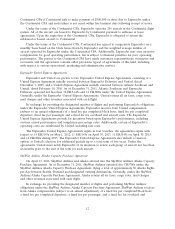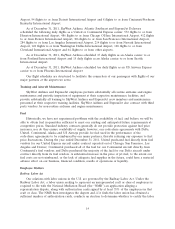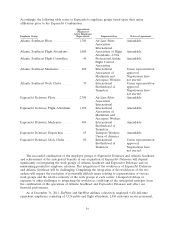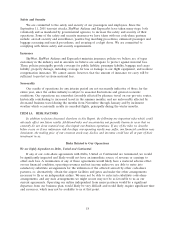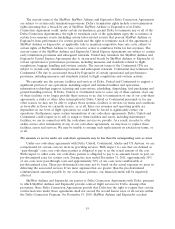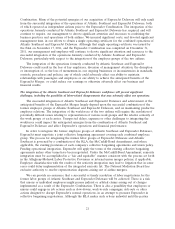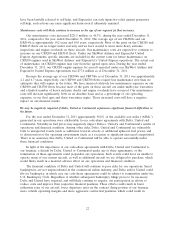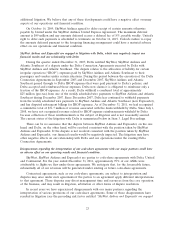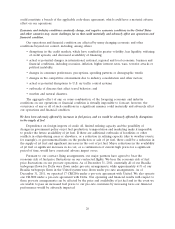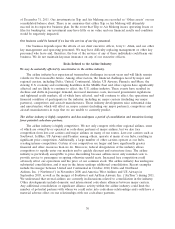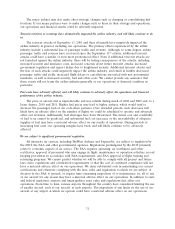SkyWest Airlines 2011 Annual Report Download - page 26
Download and view the complete annual report
Please find page 26 of the 2011 SkyWest Airlines annual report below. You can navigate through the pages in the report by either clicking on the pages listed below, or by using the keyword search tool below to find specific information within the annual report.have been lawfully released to self-help, and ExpressJet can seek injunctive relief against premature
self-help, such actions can cause significant harm even if ultimately enjoined.
Maintenance costs will likely continue to increase as the age of our regional jet fleet increases.
Our maintenance costs increased $225.5 million, or 46.3%, during the year ended December 31,
2011, compared to the year ended December 31, 2010. The average age of our CRJ200s and our
ERJ145s is approximately 10.2 years and 10.0 years, respectively. Most of the parts on the CRJ200 and
ERJ145 fleets are no longer under warranty and we have started to incur more heavy airframe
inspections and engine overhauls on those aircraft. Our maintenance costs are expected to continue to
increase on our CRJ200 and ERJ145 fleets. Under our SkyWest Airlines and ExpressJet United
Express Agreements, specific amounts are included in the current rates for future maintenance on
CRJ200 engines used in SkyWest Airlines’ and ExpressJet’s’ United Express operations. The actual cost
of maintenance on CRJ200 engines may vary from the agreed upon rates. During the year ended
December 31, 2011, our CRJ200 engine expense for aircraft operated under our SkyWest Airlines and
ExpressJet United Express Agreements was $77.6 million as of December 31, 2011.
Because the average age of our CRJ900s and CRJ700s as of December 31, 2011 was approximately
4.1 and 6.7 years, respectively, our CRJ900 and CRJ700 fleets require less maintenance now than we
anticipate they will require in the future. We have incurred relatively low maintenance expenses on our
CRJ900 and CRJ700 fleets because most of the parts on these aircraft are under multi-year warranties
and a limited number of heavy airframe checks and engine overhauls have occurred. Our maintenance
costs will increase significantly, both on an absolute basis and as a percentage of our operating
expenses, as our fleet ages and these warranties expire. Those increased costs will have a negative
impact on our financial results.
We may be negatively impacted if Delta, United or Continental experiences significant financial difficulties in
the future.
For the year ended December 31, 2011 approximately 98.8% of the available seat miles (‘‘ASMs’’)
generated in our operations were attributable to our code-share agreements with Delta, United and
Continental. Volatility in fuel prices may negatively impact Delta’s, United’s and Continental’s results of
operations and financial condition. Among other risks, Delta, United and Continental are vulnerable
both to unexpected events (such as additional terrorist attacks or additional spikes in fuel prices) and
to deterioration of the operating environment (such as a recession or significant increased competition).
There is no assurance that Delta, United or Continental will be able to operate successfully under
these financial conditions.
In light of the importance of our code-share agreements with Delta, United and Continental to
our business, a default by Delta, United or Continental under any of these agreements, or the
termination of these agreements could jeopardize our operations. Such events could leave us unable to
operate many of our current aircraft, as well as additional aircraft we are obligated to purchase, which
would likely result in a material adverse effect on our operations and financial condition.
The financial condition of Delta and United will continue to pose risks for our operations. Serial
bankruptcies are not unprecedented in the commercial airline industry, and Delta and/or United could
file for bankruptcy, in which case our code-share agreements could be subject to termination under the
U.S. Bankruptcy Code. Regardless of whether subsequent bankruptcy filings prove to be necessary,
Delta and United have required, and will likely continue to require, our participation in efforts to
reduce costs and improve their respective financial positions. These efforts could result in lower
utilization rates of our aircraft, lower departure rates on the contract flying portion of our business,
more volatile operating margins and more aggressive contractual positions, which could result in
22


